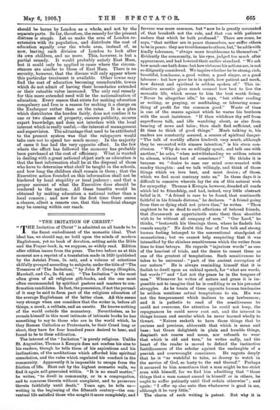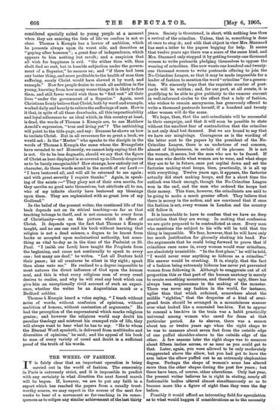"THE IMITATION OF CHRIST."
Tthe finest embodiment of the monastic ideal. That ideal has, we should say, no hold upon the minds of modern Englishmen, yet no book of devotion, setting aside the Bible and the Prayer-book, is, we suppose, so widely read. Edition after edition issues from the press. The two before us at this moment are a reprint of a translation made in 1620 (published by the Astolat Press, 3s. net), and a' volume of selections skilfully grouped according to subjects, under the title of " The Treanures of The Imitation," by John F. Crump (Simpkin, Marshall, and Co., 2s. 6d. net): " The Imitation " is the most often given of all religions gift-books, and the one most often recommended by spirithal pastors and masters to con- firmation candidates. In fact, the possession, if not the perusal, of it may be said to form part of the religious education of the average Englishman of, the better class. All this seems very strange when one considers that the writer is, before all things, a monk, a celibate, and an ascetic. He knows nothing of the world outside the monastery. Nevertheless, as he reveals himself in this most intimate of intimate books he has something to say to those who are in the world which, be they Roman Catholics or Protestants, be their Creed long or short, they have for four hundred years desired to hear, and found to be to their edification.
The interest of the " Imitation " is purely religious. Unlike St. Augustine, Thomas 1 Kempis does not confess his sins to his readers, though he tells them of his aspirations and his inclination:3, of the meditations which afforded him spiritual consolation, and the rules' which regulated his conduct in the community. - Apparently it is impossible to' escape from the friction of life. Shut out' by the highest monastic walls, we find it again self-generated within. "It is no small matter," be writes, " to dwell in community, or in a congregation, and to converse therein without' complaint, and to persevere therein faithfully until death." Years ago, he tells us— writing in the beginning of the fifteenth century—the con- ventual life satisfied those who sought it more completely, and fervour was more common, but "now he is greatly accounted of, that breaketh not the rule, and that can with patience endure that which, he bath, professed." There are some, he says, " that neither are in peace themselves, nor suffer others to be in peace : they are troublesome to others, but," he addi with kindly tolerance, " always more troublesome to themselves." Evidently the community, in his eyes, judged too much after appearances, and had lowered their earlier standard. " We salc, how. much one hath done: but how virtuous his actions are, is not so diligently considered. We inquire whether be be strong, rich, beautiful, handsome, a good writer, a good singer, or a good labourer : but how poor he is in spirit, how patient and meek, bow devout and spiritual is seldom spoken of." This in- stinctive ascestic gives much counsel bow best to live the monastic life, which seems to him the best worth living. " Never be altogether idle," he says, " but either reading or writing, or praying, or meditating, or labouring some- thing of profit for the common good." Waste of time is one of the snares against which he warns his brethren with the most insistence. "If thou withdraw thy self from superfluous talk, and idle wandring about, as also froth hearing of news and tales ; thou shalt find sufficient, and fit time to think of good things." Much talking is, his readers are constantly assured, a source of spiritual danger.
The talk of worldly affairs hindreth very much, although they be recounted with sincere intention," is his stern con- clusion. " Why do we so willingly speak, and talk one with another," he asks, "when notwithstanding we seldom return to silence, without hurt of conscience ? " He thinks it is because we " desire to ease our mind over-wearied with sundry thoughts and we talk willingly, and think of those things which we love beat, and most desire ; of those, which we feel most contrary unto us." In these days it is difficult to conceive wherein lay the sin of this natural wish for sympathy. Thomas is Kempis, however, dreaded all roads which led to friendship, and had, indeed, very little abstract belief in it. "A friend is rare to be found, that continueth faithful in his friends distress," he declares. " A friend going from thee or dying shall not grieve thee," he writes. " Thou oughtest to be so dead to such affections of beloved friends, that (forasmuch as appertaineth unto thee) thou shouldit wish to be without all company of men." " Our Lord," he thinks, " bestoweth his blessings there, where he findeth his vessels empty." No doubt this fear of free talk and strong human feeling belonged to the conventional standpoint of monasticism ; but we cannot help suspecting that it was intensified by the skinless sensitiveness which the writer from time to time betrays. He regards "injurious words" as one of the heaviest of trials, and the desire to resent them as one of the greatest of temptations. Such sensitiveness he takes to be universal: " part of the ancient corruption of our nature." He is always reminding himself that it is foolish to dwell upon an unkind speech, for "what are words, but words " and " Let not thy peace be in the tongues of men." Whenever he writes of nature and grace it is im- possible not to imagine that he is confiding to us his personal struggles. As he treats of these opposite human tendencies he seldom mentions actual temptations to sin. His was not the temperament which inclines to any lawlessness ; and it is pathetic to read of the sensitiveness he could not overcome, the attention he could not keep, the repugnances he could never root out, and the interest iu things human and secular which he never learned wholly to thwart. " Nature seeketh to have those things that be curious and precious, abhorreth that which is mean and base : but Grace delighteth in plain and humble things, despiseth not coarse and mean, nor refuseth to wear that which• is old and torn," he writes sadly, and the heart of the reader is moved to defend the instinctive fastidiousness of the scholar against the onslaughts of a peevish and overwrought conscience. He regrets deeply that he is "so watchful to tales, so drowsy to watch in the service of God, so hasty to the end thereof." Perhaps it occurred to him sometimes that a man might be too strict even with himself, for 'we find him admitting that "those things that a man cannot amend in himself or in others, he ought to suffer patiently until God ordain otherwise" ; and again: " I offer up also unto thee whatsoever is good in me, although it be very little."
The charm of such writing is patent. But why it is
considered specially suited to young people at a moment when they are entering the lists of life we confess is not so clear. Thomas it Kempis has a horror of ambition, which he presents always upon its worst side, and describes as "gaping after honours " ; a great fear of independence, which appears to him nothing but revolt ; and a suspicion that all wish for happiness is evil. " Go wither thou wilt, thou shalt find no rest, but in humble subjection under the govern- ment of a Superior," he assures us; and "if there had been any better thing, and more profitable to the health of man then suffering, surely Christ would have spewed it by word, and example." Now few people desire to crush all ambition in the young, knowing from how many worse things it is likely to free them, and still fewer would wish them to "find rest" all their lives "under the government of a Superior." Again, most Christians firmly believe that Christ, both by word and example, worked daily and hourly to relieve the sufferings of men. How is it that, in spite of all these drawbacks, all this impracticability and loyal adherence to an ideal which, in this country at least, is dead, the words of Thomas a Kempis are, to use Matthew Arnold's expression, " true and living yet" ? The unthinking will point to the title-page, and say : Because he shows us how to imitate Christ. But in all reverence for so great a book, we would ask : Is the " Master " who speaks to the disciple in the words of Thomas i, Kemple the same whom the Evangelists have revealed to us ? Honestly, we cannot help saying that He is not. Or to be less dogmatic, should we say that the figure of Christ as here displayed is so covered up in Church draperies as to be barely recognisable ? How strange, how entirely out of character, do these words sound in the mouth of our Lord :— " I have bestowed all, and will all be returned to me again : and with great severity I require thanks." Again, in speak- ing of the saints :—" They glory not of their own merits, for they ascribe no good unto themselves, but attribute all to me, who of my infinite charity have bestowed my blessings upon them. They are replenished with so great love of my Godhead."
In the belief of the present writer, the continued life of the book depends not on its ethical teaching—so far as that teaching belongs to itself, and is not common to every form of Christianity—not on the picture which it offers of Christ. It depends upon the fact that Thomas ii Kempis taught, and no one can read his book without learning that religion is not a dead science, a dogma to be learnt from books or accepted upon ecclesiastical authority, but some- thing as vital to-day as in the time of the Psalmist or St. Paul. "I (saith our Lord) have taught the Prophets from the beginning, and cease not continually to speak to every one : but many are deaf," he writes. " Let all Doctors hold their peace ; let all creatures be silent in thy sight ; speak thou alone unto me." He realised to a degree impossible to most natures the direct influence of God upon the human soul, and this is what every religious man of every creed desires to realise, and why he will read any book which can give him an exceptionally vivid account of such an experi- ence, whether the writer be an Augustinian monk or a Bedford cobbler.
Thomas is Kempis heard a voice saying, " I teach without noise of words, without confusion of opinions, without ambition of honour, without contention of arguments." He had the perception of the supernatural which marks religious genius ; and however the religious world may doubt his peculiar theology and mistrust his cramped rule of life, they will always want to hear what he has to say. "He to whom the Eternal Word speaketh, is delivered from multitudes and diversities of opinions," he said; and the appeal of his book to men of every variety of creed and doubt is a sufficient proof of the truth of his words.











































 Previous page
Previous page